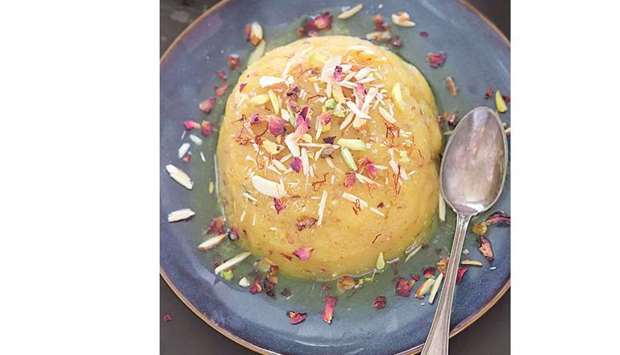Wintertime is a perfect time to enjoy delicacies of all types. First the chilled water bottles go away, then the seasonal vegetables arrive and then comes the full winter season for hot desserts. India and its connection with the array of halwa does not need an introduction, we can make halwa with almost any food item available around us. Whether it is the moong dal halwa, gajar halwa (carrot halwa) or the sooji halwa (semolina halwa) or the rawa kesari (semolina and saffron halwa) or the lauki halwa (bottle gourd halwa), they all taste so much better in winters that I could not avoid writing about them. Moong dal halwa is relished throughout Rajasthan during the winter months, as it is supposed to keep the body warm and protect us from the bitter winter cold. It is believed that halwa may have been an import from the Arab and Turkish region. The Turkish confection of ground sesame seeds and honey is believed to have travelled towards the eastern countries in primitive times and became our very own halwa as we see it today. Moong dal halwa is undoubtedly the king among all of them.
Moong dal halwa is an Indian dessert delicacy made with skinless split green gram. It is very rich due to loads of desi ghee and dry fruits that are included to make the halwa. This makes it a rich halwa, a must for weddings or festivals or special events. Moong dal halwa is a dessert with its roots in Rajasthan. Mostly, it is prepared during winters as a warm dessert. Rajasthan and its ingenious use of making the most interesting facets of Indian cooking are well known. Moong dal halwa is also considered to be one of the most auspicious dessert in the region and is prepared widely for special occasional such as Diwali or any other religious occasion or weddings. Moong dal halwa if not prepared right can turn out to be a disaster. Preparing moong dal does not require much time but it is the opposite while preparing its halwa. Moong dal halwa requires a lot of patience and muscle work and lots of ghee and dry fruits. But the amount of time and effort is worth the final product.
The tradition of eating dessert after having a meal holds a special place in Indian cuisine. At the end of a yummy dinner, there is always a sweet treat for the guests. And what could be better than a homemade moong dal halwa? My first experience with this halwa was at a wedding in Delhi as a child. It was a cold winter night, and a huge queue was lined up in front of the stall for this halwa. And believe me, it was worth the wait. While I was working in Udaipur, Rajasthan, during winters I often visited a shop which specialised in moong dal halwa and relished with friends and family.
Tips to make a good moong dal halwa:
Soak the dal overnight and then roast it over low heat until it turns golden brown in colour. This step will take around 45 minutes to an hour. This is the most important step in the recipe. It will either make or break the final taste of the halwa. The halwa once prepared can be stored for up to several days in refrigerator and can be reheated again before consumption. It is best to reheat the halwa in microwave, but you can also heat it in sauté pan over low heat.
Moong dal halwa
Ingredients
Yellow moong dal 1 cup
Desi ghee ½ cup
Saffron strands few strands
Milk 1 cup
Sugar 1 cup
Cardamom powder ½ tsp
For Garnish
Almond slivers to garnish
Pistachio slivers to garnish
Method
Wash and soak the split yellow moong dal overnight.
Drain the water and grind the moong dal in a mixer to a coarse texture and keep aside.
Dissolve saffron in 1 tbsp warm milk and keep aside.
In a heavy bottom pan heat desi ghee over medium heat.
Add the moong dal paste and stir well.
Cook over low heat for 45 minutes while stirring continuously.
Once the moong dal is cooked and the raw flavour is eliminated add some warm water and milk.
Cook again over low heat for 7-8 minutes, while stirring continuously.
Add sugar and mix well and cook for 3-5 minutes and remove from flame.
Serve warm garnished with cardamom powder, and garnish with almond and pistachio slivers.

DELICACY: Moong dal halwa is a dessert with its roots in Rajasthan, India.
